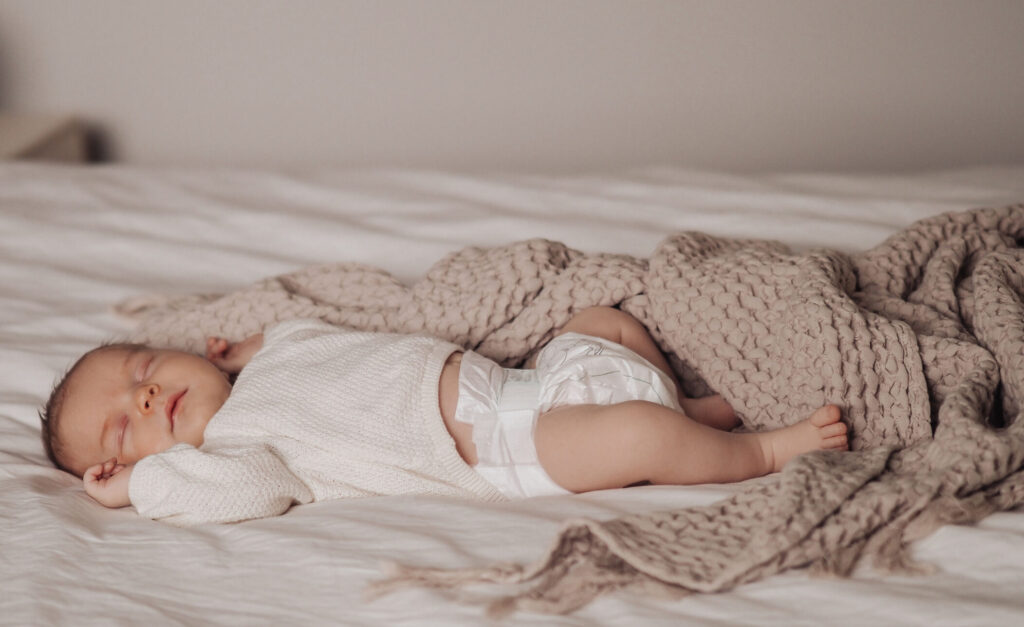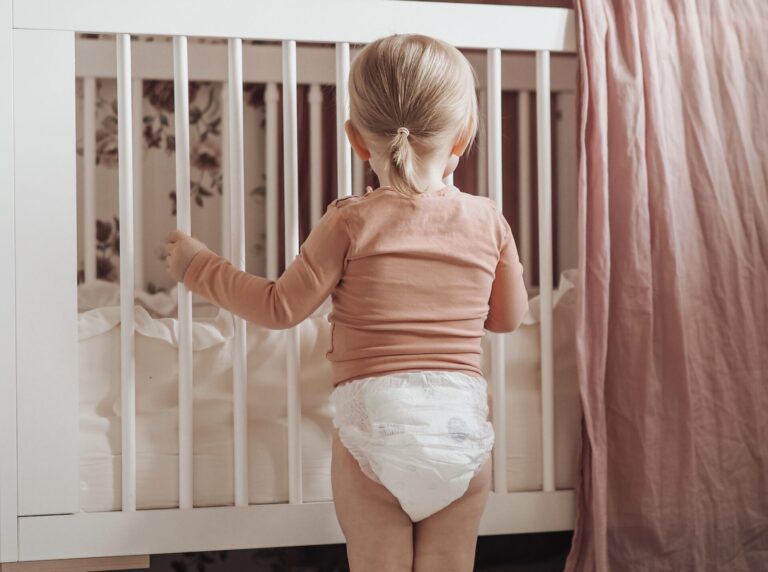The quality and amount of sleep a baby gets has a significant impact on the well-being of both the baby and the whole family. This article offers practical and easy-to-implement tips to help you improve your baby’s sleep. Our aim is to help you establish important sleep routines for your baby, reduce night terrors and ensure a more restful night’s sleep for the whole family.
Understanding the baby’s sleep rhythm
Understanding the baby’s sleep rhythm is crucial for better sleep. A baby’s sleep rhythm usually follows its own natural rhythm, which varies according to the baby’s age, health and environment. By understanding your baby’s sleep rhythm, you can plan your day better and help your baby develop a healthy sleep routine that can improve the quality of their sleep in the long term.
Read more about newborn sleep and sleep patterns here!
The role of the environment in the quality of sleep
To improve your baby’s quality of sleep, it is important to create a calm and quiet environment. Avoid bright lights and loud noises that may disturb your baby’s sleep. The temperature in the bedroom should be comfortable, not too hot or too cold. If necessary, use sleep toys or white noise machines. Make sure your baby’s bed is safe and comfortable.
Read our tips for creating a safe and cozy room here!
Creating routines: The key to better sleep
There are several ways to develop your baby’s sleep rhythm, but one of the most effective is to create a routine. A regular daily schedule with established bedtimes and wake-up times can help your baby understand when it’s time to sleep. This in turn can reduce night terrors and improve sleep quality. Routines can include evening snacks, evening washing and bedtime stories, all of which can help your baby settle down before bedtime.
Balanced and adequate nutrition during the day supports your baby’s sleep rhythm.
Effect of diet on baby’s sleep
Your baby’s diet can have a significant impact on the quality and duration of sleep. For example, too heavy meals just before bedtime can cause indigestion and prevent restful sleep. On the other hand, a balanced and adequate diet during the day will support your baby’s sleep rhythm. It is important to take individual needs into account, as every baby is different. If you suspect that your baby’s sleep is being affected by diet, consult your doctor.
How do sounds and light affect baby’s sleep?
Sound and light can have a big impact on your baby’s sleep. A calm and quiet environment is conducive to a baby’s sleep, while loud noise can disturb it. The same goes for light: a dark room helps your baby fall asleep and stay sleeping, while bright lights can be disturbing. Controlling sounds and light in the environment is an important part of your baby’s sleep routine.

The importance of daytime naps for your baby’s sleep rhythm
Daytime naps play an important role in the development of your baby’s sleep rhythm. They not only provide the baby with the rest and energy they need, but also help to establish a regular sleep rhythm. This helps to improve the quality of sleep later on. It is important to monitor your baby’s sleep cues and provide nap time as needed. A balance between day and night sleep is the key to better sleep.
Read more about your baby’s sleep at 1 month old here!
The benefits and challenges of sleep training
The Sleep School offers a number of benefits. Firstly, it helps to establish a regular sleep rhythm and improve sleep patterns for parents. Secondly, sleep school can help your baby learn the skill of falling asleep independently. However, it is important to be aware that sleep school can present challenges due to the baby’s individual sleep needs and possible reactions to changes. For sleep training to be successful, parents need to be patient, consistent and sensitive to their baby’s needs.
Read more about sleep training here!
To identify sleep disorders, it is important to monitor your baby’s sleep rhythm and behaviour during waking hours.
Identifying and treating sleep disorders in babies
A baby’s sleep disorders can manifest themselves in different ways, such as intermittent sleep, difficulty falling asleep or waking up in the night. These disorders can be caused by fever, pain or environmental disturbances. To identify sleep disturbances, it is important to monitor your baby’s sleep patterns and behaviour during waking hours. If you want to treat sleep disorders, try to create a calm environment for sleep, a regular daily routine and provide your baby with enough physical closeness and security. If necessary, consult a doctor.
How does a parent’s rest affect a baby’s sleep?
Parental rest is extremely important for the development of your baby’s sleep rhythm. When a parent gets enough sleep, they have more patience and the ability to interpret their baby’s sleep needs. A well-rested parent is also better able to plan the baby’s daily rhythm, which includes regular sleep times, mealtimes and active play times. This helps to create a calming environment that promotes good sleep for the baby.
How to avoid common mistakes in your baby’s sleep routine
To avoid the most common mistakes in your baby’s sleep routine, it is important to stick to regular bedtimes and naps. Make sure your baby’s environment is calm and dark to avoid excessive stimulation. Routines such as bedtime baths and story time can be used to help your baby understand that it’s time to sleep. It is important to avoid getting the baby used to falling asleep by external means such as feeding or rocking. Instead, it is best to teach your baby to fall asleep independently.











